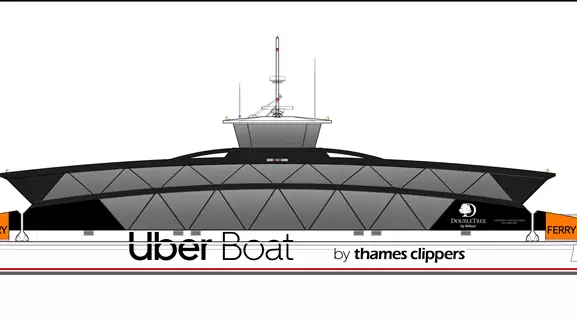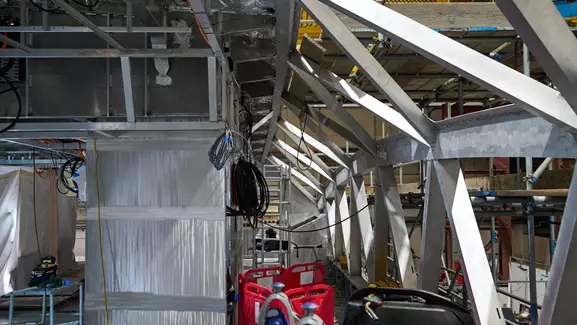Uber Boat by Thames Clippers will launch the UK’s first fully electric zero-emission cross-river passenger ferry, Orbit Clipper, in March 2025. Currently under construction at Wight Shipyard Co in East Cowes on the Isle of Wight, the vessel is intended to provide an accessible, green and fast route across the Thames seven days a week, enabling over 20,000 Londoners and visitors to travel every weekday.
Electric passenger ferry
Orbit Clipper will operate between London’s Canary Wharf on the north side of the Thames and Rotherhithe on the south. The vessel will cross the river every 10 minutes from each side on weekdays and every 15 minutes at weekends. The 150-passenger ferry, with a capacity for 100 bicycles, features a roll-on/roll-off design that enables automated docking on both sides. This enhances accessibility, reduces journey times and increases capacity for both foot and cycle passengers, the company says.
Orbit Clipper will replace the current cross-river ferry service, and continue to serve the DoubleTree by Hilton hotel in Rotherhithe and meet the demands of Canary Wharf’s growing employment center and residential neighborhoods on both sides of the river. A new step-free pontoon is being built on the south side as part of the project, and the existing pier at Canary Wharf will be modified to accommodate the new fully electric ferry berth.
This initiative has been made possible through partial sponsorship from the Clean Maritime Demonstration Competition Round 3 (funded by the Department for Transport with Innovate UK), and with project partners – high-speed aluminum shipbuilder Wight Shipyard Company, maritime civil engineering consultants Beckett Rankine, and electric infrastructure specialists Aqua SuperPower.

A greener future
This zero-emission vessel is part of Uber Boat by Thames Clippers’ broader sustainability plans to reduce carbon emissions by 50% by 2035 and achieve net zero by 2050. It follows the recent addition of three hybrid high-speed vessels to its main fleet of River Buses.
Sean Collins, co-founder and CEO of Uber Boat by Thames Clippers, said, “It’s a real British success story. All of our new boats are proudly built in the UK using the latest green technology at Wight Shipyard Co on the Isle of Wight. This new vessel will launch within our 25th year of operation and it reaffirms our investment in both the local Isle of Wight economy and in London.
“This zero-emission solution also comes after the recent launch of our third hybrid boat – Mars Clipper – into our main River Bus fleet and is the next step on our journey to advancing sustainable maritime technology. The Thames is the lifeblood of our great capital and it’s our ambition to continue to push for further progression along the river – we’re calling upon London’s maritime businesses and government bodies to collaborate and ensure a greener future for all.”
Toby Mumford, CEO, Wight Shipyard, added, “At Wight Shipyard we’re thrilled to strengthen our partnership with Uber Boat by Thames Clippers by building its first zero-emission vessel. This was our first build accessing the Innovate UK grant funding in partnership with Uber Boat by Thames Clippers, Beckett Rankine and Aqua SuperPower. Having already delivered six vessels, of which three are hybrid boats, for the fleet, this milestone represents not only a significant step forward for sustainable maritime innovation in the UK but also highlights the international potential for British-built electric vessels. We hope and expect that it is the first of many.”
Tim Beckett, director of Beckett Rankine, stated, “It’s now five years since Beckett Rankine and Uber Boat by Thames Clippers came up with the concept for a zero-emission roll-on/roll-off ferry at Rotherhithe, as an alternative to the then-proposed bridge. I am delighted that this vision is now being realized, with the aid of Wight Shipyard building the vessel and Aqua SuperPower providing the shore power connections.
“Orbit Clipper is a groundbreaking vessel in many respects, not least in that it is a double-ended, self-docking, auto-mooring ferry. This has, in turn, required the design of a novel new pier for Rotherhithe and a pier extension for Canary Wharf. The new pier is designed with a gentle gradient to make the ferries accessible for cyclists and people with restricted mobility. Improved cycle access supports wider plans for e-cargo bike river crossings. Beckett Rankine is proud to have been responsible for the design and consenting of these pier works, on which construction is due to commence in January. As London extends eastward, there is an increasing need for cross-river pedestrian and cycle links across the Thames, so Orbit Clipper couldn’t be launching at a better time.”
Matt Holland, chief project engineer, Aqua SuperPower, enthused, “Aqua SuperPower is proud to contribute its marine fast-charging expertise to this pioneering project, which sets a benchmark for future initiatives. The launch of Orbit Clipper marks a significant step in decarbonizing diesel ferries on the Thames, playing a vital role in London’s clean mobility efforts. Our involvement highlights Aqua’s commitment to marine electrification and cutting-edge infrastructure, and we are excited to collaborate with fellow industry leaders to drive this transformation forward.”
In related news, ResearchAndMarkets.com Electric Ships – Global Strategic Business Report recently revealed that the global market for electric ships was estimated at US$7.8bn in 2023 and is projected to reach US$15.7bn by 2030, growing at a CAGR of 10.5% from 2023 to 2030. Click here to read the full story.



